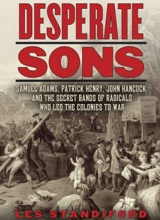Desperate Sons – Book Review
 DESPERATE SONS: Samuel Adams, Patrick Henry, John Hancock, and the Secret Band Of Radicals Who Led The Colonies To War. Les Standiford. Publisher, Harper Collins. 2012. Hardcover, 336 pages. $27.99
DESPERATE SONS: Samuel Adams, Patrick Henry, John Hancock, and the Secret Band Of Radicals Who Led The Colonies To War. Les Standiford. Publisher, Harper Collins. 2012. Hardcover, 336 pages. $27.99
Author Les Standiford is best known for his John Deal mystery series, yet over the past ten years he has produced a half-dozen works of nonfiction including the recent Bringing Adam Home. Now Mr. Standiford has turned his attention to the founding of our nation in yet another well-done release.
Desperate Sons charts the rise and activities of the Sons Of Liberty, from their successful opposition to the Stamp Act through the clash at Lexington, with a final chapter discussing what became of the men who indeed did lead the colonies into war with and won independence from Great Britain. Unlike earlier works on the subject, Standiford does not limit himself to Boston but gives us a look at Sons Of Liberty chapters at work in nearly all the colonies, particularly the activities of these vigilante patriots in South Carolina and New York. He begins in Albany where an unfortunate merchant of Dutch descent is called into a meeting and strongly advised to resign as dispensary for the hated Stamps.
{default}The author jumps around a bit in the first few chapters. While keeping readers in the "present" of the Stamp Act he explains how the tax came about, describes Ben Franklin’s Plan Of Union, examines wage scales for workers, etc. He possesses such skill, however, that the reader never loses track of the narrative, as the information flows naturally.
And that information is not just about the Sons Of Liberty, either. All through the book we are given to know about the more moderate colonists, the outright Tories, and the too-numerous government officials. From the famous British leaders such as General Gage, Governor Hutchinson, and Colonel Isaac Barre (the man who first uttered the phrase "sons of liberty" in a speech opposing the Stamp Act), to the nearly forgotten, such as Lieutenant John Montressor and poor Cadwallader Colden—always a lieutenant governor no matter how hard he tried to lead New York. We get to know these men and the beliefs that colored their decisions. We get to know, too, their foibles. Students of the Revolutionary War can’t help but take note of the scene of a drunken Lord Dunmore, after being transferred as Royal Governor from New York to Virginia, exclaiming, "They gave me New York, and now they take it away. Damn Virginia!" Little wonder Virginia was virtually independent of the crown by 1775.
Following their success in opposing the hated Stamp Act, the Sons actually began losing traction. No one needs a radical when the threat to liberty has receded. So moderate and mercantile interests prevailed in the years after the Stamp Act’s repeal, even when the Townsend Duties on imports were put into place. It was not until British leaders overreached, first by stationing troops in Boston and later by setting about to re-order colonial governments by Parliamentary fiat, that the Sons Of Liberty came again to the fore.
Given Mr. Standiford’s skill as a professional writer the book is a wonderful read, a magnificent tour of the political clime in the colonies and an insight into not just how the American Revolution began and who started it, but why it flashed into being. The equestrian statue of King George III that was torn down by an angry mob in 1776 and melted into musket balls was but six years old, Standiford reminds us. How did things come to such an abrupt breach? In answering that question, Standiford does a magnificent job of transporting us into the lives and the minds of the men (and a few women) of the times.
Indeed, among the greatest pleasures of the book are the littlest details the author adds in. The origin of tarring and feathering (begun under Richard The Lion-Hearted), the legal strategies of John Adams in the Boston Massacre trials, how Charles Townsend got the nickname Champagne Charlie. All of this and much, much more—even a few tips on finding DVDs dealing with the Sons Of Liberty—is contained herein.
Given such attention to detail, it is disappointing that the roles of the Freemasons and the Boston "Pope Day" mobs in forming the nucleus of the Sons Of Liberty is not even mentioned. Some readers may question beginning the Sons story in Albany. Also, Standiford has British officer Captain Preston giving a panicked order to fire—thus, being singularly responsible for the Boston Massacre. Most other histories on the subject give Preston the benefit of the doubt and allow that he did not issue such an order. Still and all, this is a work of deep research made easily accessible by the author’s command of writing.
Desperate Sons is an excellent work of history, a well-wrought story of the politics and political actors (and agitators) who brought a new nation to life. Readers will feel they have a seat on the wharves at the Boston Tea Party, or that they are a fly on the wall when the British make the fateful decision to begin disassembling Patriot resistance, starting with an easy march to Concord. For everyone interested in either Colonial history or political theory, this book is a must-have for your library.
Sean Stevenson lives in Pittsburgh, and when not writing can be found reading a book on colonial history (of which he owns nearly 200). He also provided a review of the Revolutionary War boardgames Germantown and Washington’s Crossing for Armchair General.


0 Comments
Trackbacks/Pingbacks